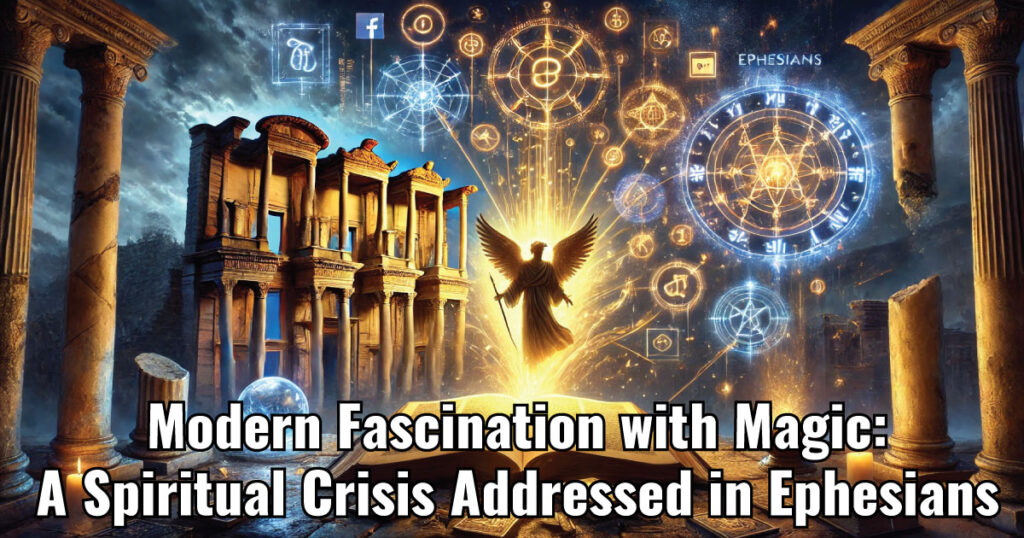
Modern Fascination with Magic: A Spiritual Crisis Addressed in Ephesians
In today’s world, magical practices are making a noticeable comeback, shaping modern culture and spirituality in ways that echo the challenges faced by the early Christians in Ephesus. This revival reflects a deep spiritual hunger but also highlights the risks of turning to mystical practices instead of seeking the transformative power of Christ. The Apostle Paul’s letter to the Ephesians offers a timeless response to these trends, urging believers to reject reliance on spiritual powers and instead embrace the sufficiency of Christ.
The Resurgence of Magic in Modern Life
Magical practices such as tarot readings, astrology, and energy rituals have surged in popularity, fueled by platforms like social media. Advertisements for fortune-tellers and supernatural services have become commonplace, and content celebrating mysticism permeates popular culture. While these trends may seem to promise empowerment or comfort, they reflect a deeper issue: an attempt to satisfy spiritual longings apart from God.
Unlike ancient superstition, modern mystical practices are often rebranded as tools for personal growth. They thrive because they offer a semblance of control in an unpredictable world. Yet, as Josephson-Storm (2017) observes, the modern fascination with magic often reflects an ongoing cultural negotiation between enchantment and disillusionment.
Ancient Ephesus: A City Gripped by Mysticism
Ephesus was a spiritual epicenter in the ancient world, home to the grand Temple of Artemis and a culture steeped in magical practices. Residents sought power and protection through charms, scrolls, and incantations, often driven by fear of the unknown (Trebilco, n.d.). Paul’s message to this community was revolutionary: Christ is supreme over all powers. In Ephesians 1:20–22, Paul declares that God raised Christ far above every authority, offering freedom from fear and a new spiritual identity.
This message resonates today. Just as the Ephesians were called to let go of practices that bound them to fear and dependence on earthly power, we, too, are invited to embrace the freedom found in trusting Christ.
Why People Turn to Magic in Times of Uncertainty
When life feels uncertain, people instinctively look for stability. For many, mystical practices seem to offer reassurance, particularly during times of economic or societal upheaval. Practices like astrology or energy healing can appear as safe, non-religious ways to gain insight or control. Yet, these practices ultimately fall short of providing lasting peace (Khoroshilov & Mashkov, 2022).
Paul addresses this longing in Ephesians 6:10–18, urging believers to put on the “Armor of God.” This spiritual armor—truth, faith, righteousness, and the word of God—empowers believers to stand firm, not by grasping for control but by resting in God’s sovereignty. This teaching remains as relevant today as it was in Paul’s time, offering a foundation for facing life’s uncertainties.
Magic Rebranded: Integration into Modern Wellness
In contemporary culture, mystical practices have merged seamlessly into wellness trends. From astrology apps to spiritual crystals marketed for “energy alignment,” these tools often promise self-discovery and empowerment (Josephson-Storm, 2017). However, Paul’s teachings caution against placing trust in anything other than Christ. Acts 19:19 describes how Ephesian converts burned their magical scrolls, rejecting a lifestyle incompatible with faith.
Understanding the Appeal: A Compassionate Approach
It’s important to acknowledge why mystical practices resonate with so many. For some, these practices fill a gap left by disillusionment with organized religion or a desire for something tangible in their spiritual journey. By recognizing these motivations, believers can respond with compassion, pointing others to the sufficiency of Christ not through condemnation but through an invitation to experience His grace and peace.
The Call to Unity in Christ
Mystical practices often focus on personal enlightenment, fostering individualism at the expense of community. In contrast, Paul’s letter to the Ephesians calls believers to unity. In Ephesians 2:15, Paul declares that Christ has created “one new humanity,” breaking down divisions and fostering reconciliation. This unity isn’t just theoretical—it provides a practical foundation for spiritual growth and support, something that individualistic practices cannot offer.
A Timeless Warning for Modern Believers
The renewed interest in mystical practices reflects a deeper spiritual crisis in modern culture. Paul’s letter to the Ephesians reminds us that turning to magic leads to spiritual separation from God. True peace and fulfillment come not from mystical rituals but from the authority of Christ, who has already triumphed over all spiritual forces.
As modern believers, we are called to evaluate where we place our trust. Are we relying on the promises of the world, or are we fully embracing the sufficiency of Christ? For those searching for meaning, Paul’s words offer a powerful invitation to trust in Christ and find unity in Him.
Call to Action
As you reflect on the modern fascination with magic, take time to study the book of Ephesians, particularly chapters 1 and 6. Ask yourself where you might be relying on worldly or mystical practices rather than fully trusting in God’s power. How can you equip yourself with the “Armor of God” in your daily life? Spend time in prayer, seeking God’s guidance, and align your heart with His truth. Share your reflections with a trusted community or mentor, and let Paul’s message inspire you to embrace the freedom and unity found in Christ.
References
Harrill, J. A. (2014). Ethnic fluidity in Ephesians. New Testament Studies, 60(3), 379–402. https://doi.org/10.1017/S0028688514000114
Josephson-Storm, J. A. (2017). The myth of disenchantment: Magic, modernity, and the birth of the human sciences. University of Chicago Press.
Khoroshilov, D., & Mashkov, D. S. (2022). Study of magic in modern society through the prism of biography. RSUH/RGGU Bulletin: Psychology, Pedagogics, and Education.
Kravchenko, P., & Holoshchapova, A. (2023). Magic in the consciousness of the modern human. Philosophical Horizons, 46.
Trebilco, P. (n.d.). The early Christians in Ephesus from Paul to Ignatius. Retrieved from https://consensus.app/papers/christians-ephesus-paul-ignatius-trebilco/e07bdbd06ad055739516f044430337c9
